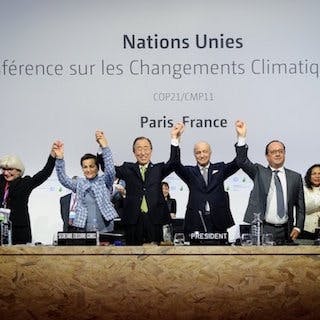
Saturday night in Paris, at 7:30 p.m. on December 12, the world turned a corner. By approving a new global agreement on climate change, it committed itself to protecting the future of humanity.
After two centuries of prosperity built on the use of coal, oil, and natural gas, representatives of nearly 200 countries at the United Nations Climate Change Conference resolved to turn away from those fuels and embrace a new future of clean energy.
The reason is simple: Carbon dioxide and other emissions from fossil fuels are trapping the sun’s heat and causing the Earth to warm. This year will go down as the hottest in the 136 years on record, consistent with a 100-year trend of temperatures rising from decade to decade. People all over the world are feeling the impacts of this changing climate. If left unchecked, the very future of humanity would be at risk.
The Paris conference lasted for just two weeks, but it built on two years of preparations, in which almost every country in the world committed to reduce its carbon pollution – led by the two largest emitters, the U.S. and China. More than that, it built on more than two decades of effort since 1992, when the world agreed in Rio on a new treaty, the UN Framework Convention on Climate Change, to prevent dangerous man-made interference with the global climate system.
The road from Rio to Paris was a long and tortuous one. An agreement in Kyoto in 1997 turned out to be a costly detour, ending in stalemate in Copenhagen in 2009. The Paris Agreement is remarkable because it broke that deadlock. It includes all nations and calls for them to come together every five years to strengthen their commitments again and again in order to reach ambitious new goals for reducing climate change.
In Rio, the world announced its intention to respond. In Paris, it stated its readiness to act.
Getting to this point has been like pushing a large rock to the top of a hill. In Paris we got it over the top. Now our work is to speed it down the other side, to a place of safety for humanity – because we are in a race with Mother Nature to undo the damage we have already done.
Lest we forget, this was a triumph made possible by the United Nations. It is easy to take the UN for granted – but it is hard to imagine how such an agreement could have been reached without the UN as a mechanism for convening all the governments of the world.
So today we celebrate, and deservedly so. The hard work of implementation remains – of transforming the world’s energy systems from dirty to clean and of finding new ways to protect our forests and capture the carbon in the air to enrich our soils and do good instead of harm. But change for the better is on its way, and the future is brighter than it was before Paris.
UN Secretary-General Ban Ki-moon got it just right on Saturday night. As he put it: “What was once unthinkable has now become unstoppable.”
[Photo: UNFCCC]

